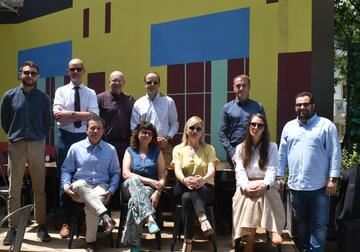
Members of the fact-finding mission to North Macedonia
Credits: Association of Journalists of Macedonia
From 5-7 June 2023, representatives of the European Federation of Journalists (EFJ), European Centre for Press and Media Freedom (ECPMF), Free Press Unlimited (FPU), International Press Institute (IPI) and the Osservatorio Balcani e Caucaso Transeuropa (OBCT) took part in a fact-finding mission to North Macedonia, organised by the Association of Journalists of Macedonia (ZNM). While we recognise progress for media freedom and journalists’ working conditions in recent years, this improvement is fragile and must be consolidated.
We welcome the recent adoption of amendments to the Penal Code. Under the new provisions, developed in collaboration with local civil society, attacks on journalists will be treated the same as attacks on public officials, entailing ex officio prosecution and more severe punishment. We also appreciate the decision of the public prosecutor’s office to establish a designated contact point for media workers who are attacked and the protocol that has been developed to better protect women journalists against online harassment. Equally, we acknowledge the improvements to the civil libel laws. If duly implemented, these new rules could contribute to the fight against impunity for crimes against journalists, which remains an issue of grave concern, and discourage future attacks and threats. We also expect to see welcome reforms of the public broadcaster and the media regulator passed by parliament in a timely manner. A more systematic approach to the harmonisation of media legislation with the EU acquis and standards is required.
Despite this progress, journalism remains in danger in North Macedonia. Polarisation, a lack of pluralism, poor working conditions and unsustainable media companies characterise the landscape. Decisive action by the authorities is needed to ensure that Macedonia’s citizens can access independent and pluralist information. In our discussions with the authorities, we raised the possibility of establishing a public fund for media pluralism. This would ensure the allocation of support objectively and equitably, bolstering quality content, diversity of editorial positions, and journalists’ working conditions. We welcome the openness of our interlocutors, particularly the President of the Republic, Mr Pendarovski and the Prime Minister, Mr Kovachevski, to discuss this proposal.
However, we are concerned to have learned from the Prime Minister and the Minister of Information Society and Public Administration that the Government is considering reintroducing state advertising via paid political campaigns in private media. Besides being questionable in terms of compliance with the EU acquis on state aid, this approach will serve to reinforce the position of already-dominant media at the expense of smaller outlets and increase the risk of political interference in the media.
Lastly, we remain concerned by statements made by politicians and public office holders that contribute to a hostile climate for journalists. We have seen repeated instances of politicians across the spectrum questioning individual reporters’ professionalism, insinuating that they are serving ulterior motives outside the public interest, and making unwarranted sweeping statements that put the whole profession in a negative light. While our interlocutors acknowledged that creating a conducive environment for journalists’ safety is crucial, we are disappointed to find a lack of commitment to concrete action that can improve the situation. Overall, this unacceptable behaviour by politicians undermines the public trust in media and signposts to others that journalists are a fair target for harassment on social media, Strategic Lawsuits Against Public Participation (SLAPPs), or worse.
We will publish a report with the full findings of the fact-finding mission in the upcoming months, in addition to a detailed policy position on the need to create a public fund for media pluralism. We stand ready to provide our expertise to advance media pluralism and journalists’ safety in North Macedonia, and will continue to follow developments closely in collaboration with our local partners.
The fact-finding mission met with the President of the Republic, Mr Stevo Pendarovski; Prime Minister, Mr Dimitar Kovachevski; President of the Parliament, Mr Talat Dzaferi; Minister of Information and Public Administration, Mr Azir Aliu; Ambassador of the EU, Mr David Greer; Deputy Public Affairs Officer Augusta Philbin of the Embassy of the United States of America; Director of Macedonia Radio and Television, Mr Marjan Cvetkovski; and Director of the Agency for Audio and Audio-visual Media Services, Mr Zoran Trajchevski.
Signed:
European Centre for Press and Media Freedom (ECPMF)
European Federation of Journalists (EFJ)
International Press Institute (IPI)
Free Press Unlimited (FPU)
OBC Transeuropa (OBCT)
Tags: North Macedonia Media freedom Safety of journalists Political pressure
This content is part of the Media Freedom Rapid Response (MFRR), a Europe-wide mechanism which tracks, monitors and responds to violations of press and media freedom in EU Member States and Candidate Countries. The project is co-funded by the European Commission.


